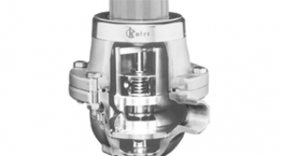

All industries that require the delivery of gas or liquid media for chemical processes use flow controllers. However, when processes occur in potentially hazardous environments or involve volatile gasses or liquids, flow control becomes crucial.
In this article, Fluid Controls discusses the importance of flow control in hazardous work environments and how to manage hazard prevention with flow controllers. Before we begin, let’s consider which work environments would be considered hazardous.
Every workplace has hazards. From offices to warehouses, chances are there will be some degree of risk that employers must manage to ensure employees do not come into harm’s way. The most common categories of workplace hazards include: biological, chemical, ergonomic and physical.
However, some work environments are considered to be more hazardous than others. Certain sectors or occupations, such as working on an off-shore oil ring or a petrochemical plant, present a greater risk to employee personal safety due to an increased number of hazardous variables.
Where flow control is concerned, regulating a potentially flammable liquid or gas in a highly-sensitive environment would be considered hazardous. One wrong move or misjudgement could lead to disaster. With this in mind, careful consideration must be given to how these substances are controlled.
Applying effective controls is the best method of hazard prevention in the work environment. This rule of thumb applies as much to hazardous environments as it does to non-hazardous ones. If hazards cannot be removed or eliminated outright, then ensuring the right equipment is used to control them is the next best step.
The purpose of flow controllers in hazardous work environments is not just to control a hazardous substance, but to reduce the overall risk at the source. When considering fluid automation, any flow controlling equipment used must operate safely and comply with the strictest regulations.
Choosing the right equipment is of the utmost importance. For example, solenoid valves are known to perform immensely well in hazardous environments. While pneumatic valves offer a simple, reliable method of flow control that eliminates fire and explosion hazards by removing electricity from the delivery process.
Whichever flow control equipment you choose, ensure it is able to safely perform the function required within your work environment. Remember, when it comes to employee safety in hazardous environments, you can never be too careful.
If you are not sure about which flow controller is best suited to your work environment, contact Fluid Controls today on 0118 970 2060 or via email at fluid@fluidcontrols.co.uk